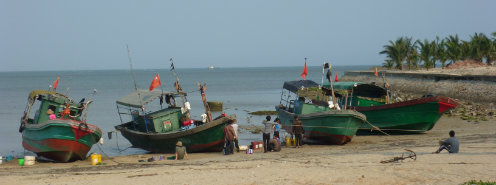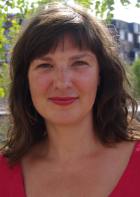ERC starting grant for exploring expansions of fishers outwards from the South China Sea
Edyta Roszko, PhD, has received a Starting Grant from the European Research Council for an innovative anthropological research project exploring transoceanic networks connecting Chinese, Vietnamese, African and Oceanian fishers.

The South China Sea is known as a contested maritime battleground. Not just for state sovereignty, oil and gas but above all for the marine resources on which large populations in Vietnam, China, Malaysia, the Philippines and Indonesia depend. Since 2016, the number of Chinese and Vietnamese vessels fishing expanding outwards from the South China Sea have increased rapidly, leading to a clear erosion of marine resources beyond the South China Sea. The local and geopolitical implications of the competition for resources have been widely addressed in the media and in academic debates, but the knock-on effects of the competition on distant oceans has remained understudied.
- The new research project will advance our understanding of the patterns behind the transoceanic expansion of fishers from the South China Sea to Africa and Oceania, says Edyta Roszko, Principal Investigator.
The research project is carried out within the Department of Anthropology, Faculty of Social Sciences, University of Copenhagen.
Addressing a global challenge
The interdisciplinary project draws on insights from history, geography, political science and legal science.
- For the first time we will explore the transoceanic expansion of fishers beyond security concerns and territorially bounded fisheries, Edyta Roszko says.
The new project will map usually separated histories and activities of different fishing groups and communities in a wider analysis of transoceanic expansion. It will analyze and theorize how fishers move in and out of categories of legal and illegal, state and non-state in their present transoceanic expansion. 
And this is a timely and exiting research project, Helle Samuelsen, Head of the Department of Anthropology, says.
- The research project addresses a complex environmental challenge, she says and adds:
- It is the fourth ERC grant which the Department of Anthropology in Copenhagen is attracting. This confirms, I think, that our department is a world-class anthropological department.
What happens and how?
Until now most scholarly attention has been devoted to the expanding scale and the environmental impact of globalizing fisheries. Such quantitative assessments give us an idea of the scale of the problem in terms of vessel tonnage and catch, harvest of endangered species and unsustainable fishing methods. But they contribute little to our understanding of how the transoceanic networks facilitate fishers’ maritime mobility.
- While we are beginning to recognize, that these forms of marine exploitation and maritime occupational mobilities are happening in the Pacific, Indian and Atlantic Oceans, we still have no knowledge, what exactly happens and how, says Edyta Roszko.
The project Transoceanic Fishers: Multiple mobilities in and out of the South China Sea will run for five years, and will involve – besides Edyta Roszko – three postdocs working in Asia, Oceania and Africa.
Contact
Edyta Roszko, Ph.D.
E-mail: rxk841@hum.ku.dk
Phone: + 45 71 58 02 68
Topics
Related News
Contact
Edyta Roszko, Ph.D.
E-mail: rxk841@hum.ku.dk
Phone: + 45 71 58 02 68
Maj Bach Madsen
Communications officer
Email: mbm@samf.ku.dk
Phone:+45 35 32 63 50
ERC Starting Grants
Other ERC Grants, Department of Anthropology
- Consolidator Grant for ‘Criminal Entanglements’, which focuses on the social infrastructure of international crime.
- Starting Grant for ‘The Vitality of Disease’ focuses on how healthcare seeks to improve the lives of those living with disease.
- Advanced Grant for the research project '‘Waterworlds’. Focused on how communities around the world tackle changing climate.
